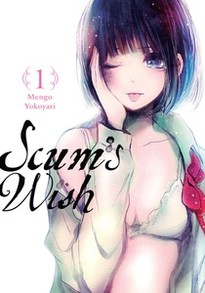Review
by Rebecca Silverman,Scum's Wish
GN 1
| Synopsis: |  |
||
Mugi and Hanabi are the envy of all of their classmates – a perfect, beautiful, and apparently loving couple. But that's all just a façade – both of them are actually in love with unobtainable people, Hanabi with her childhood friend-turned-homeroom teacher and Mugi with his tutor, who is now the music teacher at their high school. Together they seem to find at least physical comfort, but how long can their unhealthy relationship last? |
|||
| Review: | |||
Scum's Wish is a difficult story. A bit like a “lite” version of Inio Asano's The Girl on the Shore, the story takes on the idea of budding sexuality and the disconnect between a physical and emotional relationship between a pair of unhappy seventeen-year-olds. While it is distinctly less fraught than Asano's manga and certainly less explicit, the same sort of unhealthy relationship is brewing between the protagonists as this first volume comes to a close. The story follows two seemingly perfect high school students. Hanabi is the girl all the boys wish they could have, while Mugi is the popular boy equivalent. They are dating, by all indications, and they clearly enjoy a physical component to their relationship. In reality, however, they seem to just be using each other to assuage their longings: Hanabi is in love with her (older) childhood friend who is now her homeroom teacher, while Mugi pines for his former tutor who also now works at their school. When they discover their shared unrequited loves, they become friends, and eventually that morphs into a “false” relationship. While they aren't actually having sex yet (Mugi is very clear about that), the closest term for their relationship is “sex friends.” But is there really no emotional draw to what they share? Hanabi thinks not – she believes herself fully in love with “Onii-chan” and willing to use Mugi as a physical substitute at his suggestion. She enjoys their make-out sessions a lot, and to its credit, the manga never suggests that her own sexuality or pleasure is somehow wrong or “dirty.” We can see that a part of her is fully aware that it's Mugi who is kissing and touching her, despite her attempts to completely replace him with her teacher in her mind. For his part, Mugi seems on board with the relationship as well. In fact, he's the one who truly initiates it, although it's clear that Hanabi was thinking about the idea. Mugi is the one who lays the ground rules about not actually having sex, although we mostly see Hanabi being the one to request physical contact. The fact that we never get inside Mugi's head opens the possibility that perhaps he's got more emotional interest in what they're doing – apart from one scene, we don't see much of him yearning after his supposed love, and he raises the question of whether or not Hanabi is jealous of him on a couple occasions for various reasons. The idea that Mugi may actually have feelings for Hanabi, or that Hanabi may be willfully ignoring her own burgeoning emotions for him, gives this story a bittersweetness that it would otherwise lack, if only because the two adults are so utterly oblivious to the kids that it's clear there's zero chance of them ever returning their affections. It's this potential emotional entanglement that also keeps the story worth reading. There's plenty of manga in all demographics about pining after someone unobtainable, but very few take the step of having the characters know that their crushes are hopeless and thus seek an alternative method of satisfaction. While the sexuality of the story may be off-putting to some readers, more at issue is Hanabi's extreme dislike for herself. She can't understand why she's able to find solace (and pleasure) in Mugi, and she's upset with herself for not having seized her chance to tell her crush how she felt. She can't quite reconcile anything about her current life. Seeing herself as “scum,” while extreme, also says a lot about the emotional fragility of teenagers. This makes her a strange combination of relatable and unlikable – she's so caught up in her own issues that she can't see what's going on around her, and while many readers can remember being like that, it's not always a great memory. Mugi is still an unknown at this point (hopefully we'll get some chapters from his perspective as the story goes on), and that also makes this an interesting book. Is Hanabi just so invested in her own little world that she can't see him as anything other than herself in a male body? We know from a flashback that she has a tendency to lash out when she's upset, so what does that portend for their relationship? Scum's Wish's first volume isn't an easy read, although it can be difficult to really pin down why. Mengo Yokoyari keeps things, if not subtle, then at least somewhat nebulous. The art is just explicit enough to get things across without delving into M-rated territory, and that works very well for the nature of the characters' relationship. As with many romances, there isn't much in the way of backgrounds, but in this case that works for the internal nature of the story. This may not go anywhere positive as a narrative, but it looks like Scum's Wish will be the kind of bumpy ride worth taking. |
| Grade: | |||
|
Overall : B
Story : B+
Art : B
+ Interesting emotional storyline, Hanabi is relatable in her flaws, just sexually explicit enough for the story |
|||
| discuss this in the forum (7 posts) | | |||
| Production Info: | ||
|
Full encyclopedia details about Release information about |
||